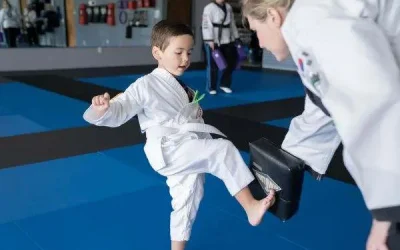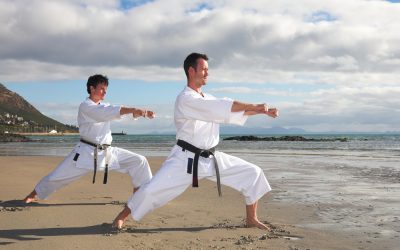Bullying and peer pressure are realities that many children face in today’s world. Whether at school or in social settings, kids may encounter situations that challenge their self-esteem, emotional well-being, and ability to stand up for themselves. As a parent, it’s natural to want to equip your child with the tools they need to handle these challenges effectively. One of the best ways to do so is by enrolling them in karate classes.
Karate, like other martial arts, provides children with valuable life skills that go beyond physical strength. It offers a safe and supportive environment where they can build the confidence, mental fortitude, and emotional resilience needed to deal with bullying and peer pressure.
1. Building Confidence and Self-Esteem
A child who believes in themselves is less likely to be intimidated by bullies or succumb to peer pressure. Karate focuses on helping kids build self-confidence through goal-setting, personal achievements, and the encouragement of positive behavior. As they progress through their training—earning belts, learning new techniques, and overcoming challenges—children gain a strong sense of accomplishment.
This confidence extends beyond the dojo, equipping kids to handle difficult situations in everyday life. They learn to speak up for themselves and assert their boundaries, both of which are crucial for navigating bullying and peer pressure.
Example: In karate, when a child achieves a new belt level, it gives them a tangible sense of success and boosts their self-worth. With each accomplishment, they learn that they are capable of handling difficult challenges, which helps them develop a “can-do” attitude toward other obstacles, including bullies.
2. Teaching Respect and Self-Control
Karate places a strong emphasis on respect—for both others and oneself. In karate, children are taught the importance of showing respect to their instructors, peers, and even opponents. This respect extends to personal boundaries, which helps kids understand the importance of standing firm when someone crosses those lines—whether physically or emotionally.
Self-control is also a key component of martial arts training. In karate, children learn how to control their emotions, avoid rash decisions, and think before reacting. This ability to pause and reflect is essential when dealing with peer pressure or bullying, as it helps kids stay calm and make rational choices rather than being driven by fear or anger.
Example: A child who has been trained in karate is less likely to engage in physical confrontations when faced with a bully. Instead, they will have the tools to stay composed and either stand up for themselves verbally or walk away from a harmful situation.
3. Developing Emotional Resilience
One of the most significant benefits of karate for children is the emotional resilience it fosters. Martial arts training teaches kids that setbacks and failures are part of the process, and they should not give up in the face of challenges. Whether it’s a tough sparring match, an injury, or a difficult training session, children learn to bounce back and keep going.
This resilience translates directly into their ability to handle bullying and peer pressure. Kids who are emotionally resilient are less likely to internalize hurtful words or actions from others. Instead, they are better equipped to navigate these experiences without letting them affect their self-worth.
Example: If a child faces teasing or exclusion from a group of peers, they can use the emotional resilience developed through karate to rise above the situation. Rather than internalizing the negativity, they recognize that they can continue to be proud of themselves and their abilities.
4. Promoting Physical Awareness and Personal Safety
While karate is not about fighting, it does teach children how to be physically aware of their surroundings and how to protect themselves if necessary. The training focuses on defensive techniques that help kids stay safe, should they ever find themselves in a physically aggressive situation.
Learning how to maintain personal space and assert oneself physically can help children feel empowered. They become more aware of their own strength and know how to use it effectively, not just for self-defense, but also in setting boundaries with others.
Example: A child who practices karate learns how to handle unwanted physical contact with confidence and respect. They may be more likely to report bullying or take steps to remove themselves from an unsafe situation, all while feeling capable of defending themselves if needed.
5. Teaching Problem-Solving and Conflict Resolution
Karate teaches children how to approach challenges with a calm, strategic mindset. Instead of jumping to conclusions or reacting emotionally, they learn to assess the situation and determine the best course of action. This problem-solving approach is invaluable when dealing with bullying or peer pressure, as it enables children to think critically about the situation and choose the most effective response.
Example: If a child is being peer-pressured into doing something they’re uncomfortable with, they can apply the problem-solving skills learned in karate to evaluate their options. They’ll be able to assert their boundaries confidently, and if needed, walk away from the situation without fear of judgment.
How Karate Classes for Kids Help
At Destiny Martial Arts Academy, we understand the importance of teaching kids how to navigate life’s challenges. Our karate programs focus on building confidence, discipline, and emotional resilience, all of which are essential in helping children deal with bullying and peer pressure.
We offer classes for children of all ages, starting with:
-
Tiny Tigers (Ages 4-5): These classes introduce young children to basic martial arts skills while emphasizing respect, focus, and confidence.
Learn more about Tiny Tigers here. -
Little Dragons (Ages 6-7): Building on the foundation of Tiny Tigers, this program focuses on discipline, self-control, and further developing physical skills.
Learn more about Little Dragons here. -
Kids Martial Arts (Ages 8-12): This class is designed to help children develop leadership skills, physical fitness, and self-confidence, with a focus on karate techniques and personal growth.
Learn more about Kids Martial Arts here. -
Ki Gong (Ages 12+): This program focuses on building mental and physical strength through traditional martial arts practices, emphasizing balance, breathing, and flexibility.
Learn more about Ki Gong here.
By enrolling your child in one of these age-appropriate programs, you are giving them the tools they need to confidently handle difficult situations and navigate bullying and peer pressure with resilience and respect.
Get Started Today: Free Class Pass
We invite you to give your child the opportunity to build confidence, resilience, and self-defense skills. Sign up today for a Free Class Pass at Destiny Martial Arts Academy and watch your child thrive in a supportive and empowering environment.









